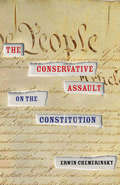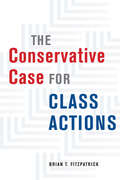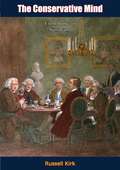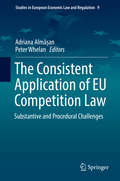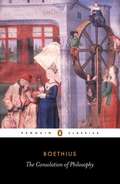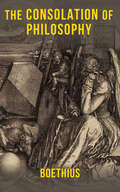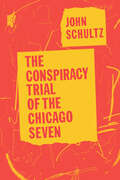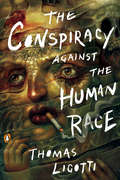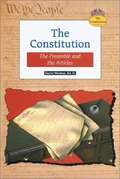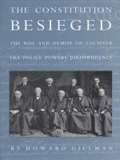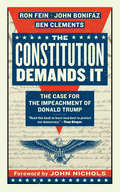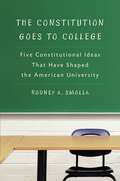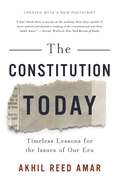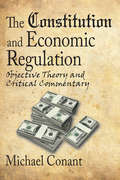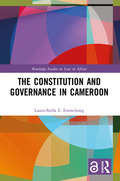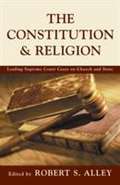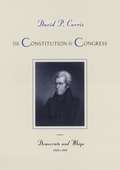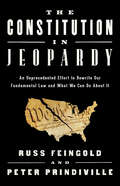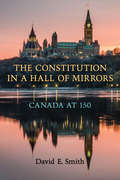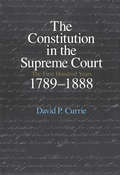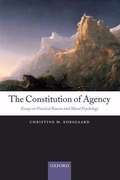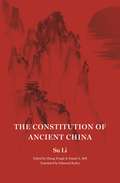- Table View
- List View
The Conservative Assault on the Constitution
by Erwin ChemerinskyOver the last few decades, the Supreme Court and the federal appellate courts have undergone a dramatic shift to the right, the result of a determined effort by right-wing lawmakers and presidents to reinterpret the Constitution by reshaping the judiciary. Conservative activist justices have narrowed the scope of the Constitution, denying its protections to millions of Americans, exactly as the lawmakers who appointed and confirmed these jurists intended. Basic long-standing principles of constitutional law have been overturned by the Rehnquist and Roberts courts. As distinguished law professor and constitutional expert Erwin Chemerinsky demonstrates in this invaluable book, these changes affect the lives of every American. As a result of political pressure from conservatives and a series of Supreme Court decisions, our public schools are increasingly separate and unequal, to the great disadvantage of poor and minority students. Right-wing politicians and justices are dismantling the wall separating church and state, allowing ever greater government support for religion. With the blessing of the Supreme Court, absurdly harsh sentences are being handed down to criminal defendants, such as life sentences for shoplifting and other petty offenses. Even in death penalty cases, defendants are being denied the right to competent counsel at trial, and as a result innocent people have been convicted and sentenced to death. Right-wing politicians complain that government is too big and intrusive while at the same time they are only too happy to insert the government into the most intimate aspects of the private lives of citizens when doing so conforms to conservative morality. Conservative activist judges say that the Constitution gives people an inherent right to own firearms but not to make their own medical decisions. In some states it is easier to buy an assault rifle than to obtain an abortion. Nowhere has the conservative assault on the Constitution been more visible or more successful than in redefining the role of the president. From Richard Nixon to George W. Bush, conservatives have sought to significantly increase presidential power. The result in recent years has been unprecedented abuses, including indefinite detentions, illegal surveillance, and torture of innocent people. Finally, access to the courts is being restricted by new rulings that deny legal protections to ordinary Americans. Fewer lawsuits alleging discrimination in employment are heard; fewer people are able to sue corporations or governments for injuries they have suffered; and even when these cases do go to trial, new restrictions limit damages that plaintiffs can collect. The first step in reclaiming the protections of the Constitution, says Chemerinsky, is to recognize that right-wing justices are imposing their personal prejudices, not making neutral decisions about the scope of the Constitution, as they claim, or following the "original meaning" of the Constitution. Only then do we stand a chance of reclaiming our constitutional liberties from a rigid ideological campaign that has transformed our courts and our laws. Only then can we return to a constitutional law that advances freedom and equality.
The Conservative Case for Class Actions
by Brian T. FitzpatrickSince the 1960s, the class action lawsuit has been a powerful tool for holding businesses accountable. Yet years of attacks by corporate America and unfavorable rulings by the Supreme Court have left its future uncertain. In this book, Brian T. Fitzpatrick makes the case for the importance of class action litigation from a surprising political perspective: an unabashedly conservative point of view. Conservatives have opposed class actions in recent years, but Fitzpatrick argues that they should see such litigation not as a danger to the economy, but as a form of private enforcement of the law. He starts from the premise that all of us, conservatives and libertarians included, believe that markets need at least some rules to thrive, from laws that enforce contracts to laws that prevent companies from committing fraud. He also reminds us that conservatives consider the private sector to be superior to the government in most areas. And the relatively little-discussed intersection of those two beliefs is where the benefits of class action lawsuits become clear: when corporations commit misdeeds, class action lawsuits enlist the private sector to intervene, resulting in a smaller role for the government, lower taxes, and, ultimately, more effective solutions. Offering a novel argument that will surprise partisans on all sides, The Conservative Case for Class Actions is sure to breathe new life into this long-running debate.
The Conservative Mind: From Burke to Santayana
by Russell Kirk"It is inconceivable even to imagine, let alone hope for, a dominant conservative movement in America without Kirk's labor." — William F. Buckley, Jr.Russell Kirk's The Conservative Mind is one of the greatest contributions to twentieth-century American conservatism. Brilliant in every respect, from its conception to its choice of significant figures representing the history of intellectual conservatism, The Conservative Mind launched the modern American Conservative Movement when it was first published in 1953 and has become an enduring classic of political thought.—Print ed.
The Consistent Application of EU Competition Law
by Peter Whelan Adriana AlmășanIn recent years, there has been a decentralisation of the enforcement of the EU competition law provisions, Articles 101 and 102 of the Treaty on the Functioning of the European Union. Consequently, the national application of these provisions has become increasingly more common across the European Union. This national application poses various challenges for those concerned about the consistent application of EU competition law. This edited collection provides an in-depth analysis of the most important limitations of, and the challenges concerning, the applicability of Articles 101 and 102 of the Treaty on the Functioning of the European Union (TFEU) at national level. Divided into five parts, the book starts out by examining how the consistent enforcement of Articles 101 and102 operates as a general EU competition policy. It then discusses several recent landmark cases of the European Court of Justice on Articles 101 and 102 TFEU, before proceeding to analyse certain additional, unique jurisdictional challenges to the uniform application of the EU competition law provisions. Subsequently, it focuses on one of the most important instruments that can help to achieve the uniform application of EU competition law in cases handled by the national courts: preliminary rulings. Finally, it provides selective examples of how Articles 101 and 102 TFEU are effectively applied at national level, thereby providing additional input into how problematic the issue of consistent application of EU competition law is in practice.
The Consolation of Philosophy
by Ancius BoethiusBoethius was an eminent public figure under the Gothic emperor Theodoric, and an exceptional Greek scholar. When he became involved in a conspiracy and was imprisoned in Pavia, it was to the Greek philosophers that he turned. THE CONSOLATION was written in the period leading up to his brutal execution. It is a dialogue of alternating prose and verse between the ailing prisoner and his 'nurse' Philosophy. Her instruction on the nature of fortune and happiness, good and evil, fate and free will, restore his health and bring him to enlightenment. THE CONSOLATION was extremely popular throughout medieval Europe and his ideas were influential on the thought of Chaucer and Dante.
The Consolation of Philosophy
by Anicius Manlius BoethiusIn this highly praised new translation of Boethius’s The Consolation of Philosophy, David R. Slavitt presents a graceful, accessible, and modern version for both longtime admirers of one of the great masterpieces of philosophical literature and those encountering it for the first time. Slavitt preserves the distinction between the alternating verse and prose sections in the Latin original, allowing us to appreciate the Menippian parallels between the discourses of literary and logical inquiry. His prose translations are lively and colloquial, conveying the argumentative, occasionally bantering tone of the original, while his verse translations restore the beauty and power of Boethius’s poetry. The result is a major contribution to the art of translation.Those less familiar with Consolation may remember it was written under a death sentence. Boethius (c. 480–524), an Imperial official under Theodoric, Ostrogoth ruler of Rome, found himself, in a time of political paranoia, denounced, arrested, and then executed two years later without a trial. Composed while its author was imprisoned, cut off from family and friends, it remains one of Western literature’s most eloquent meditations on the transitory nature of earthly belongings, and the superiority of things of the mind. In an artful combination of verse and prose, Slavitt captures the energy and passion of the original. And in an introduction intended for the general reader, Seth Lerer places Boethius’s life and achievement in context.
The Consolation of Philosophy
by BoethiusOften described as the last great work of Western classical antiquity, Boethius' Consolation of Philosophy grapples with many of the enduring questions in philosophy; the problem of evil, determinism vs. free-will and nature of virtue and justice, among others. Though a committed Christian, Boethius arrives at his conclusions by means of the natural philosophical methods of Classical Greece alone, being of the opinion that faith and reason must necessarily arrive at the same conclusions.
The Conspiracy Trial of the Chicago Seven
by John SchultzIn 1969, the Chicago Seven were charged with intent to "incite, organize, promote, and encourage" antiwar riots during the chaotic 1968 Democratic National Convention in Chicago. The defendants included major figures of the antiwar and racial justice movements: Abbie Hoffman and Jerry Rubin, the madcap founders of the Yippies; Tom Hayden and Rennie Davis, founders of Students for a Democratic Society and longtime antiwar organizers; David Dellinger, a pacifist and chair of the National Mobilization Committee to End the War in Vietnam; and Bobby Seale, co-founder of the Black Panther Party, who would be bound and gagged in the courtroom before his case was severed from the rest. The Conspiracy Trial of the Chicago Seven is an electrifying account of the months-long trial that commanded the attention of a divided nation. John Schultz, on assignment for The Evergreen Review, witnessed the whole trial of the Chicago Seven, from the jury selection to the aftermath of the verdict. In his vivid account, Schultz exposes the raw emotions, surreal testimony, and judicial prejudice that came to define one of the most significant legal events in American history. In October 2020, Aaron Sorkin's film, The Trial of the Chicago Seven, will bring this iconic trial to the screen.
The Conspiracy against the Human Race: A Contrivance of Horror
by Thomas LigottiIn Thomas Ligotti's first nonfiction outing, an examination of the meaning (or meaninglessness) of life through an insightful, unsparing argument that proves the greatest horrors are not the products of our imagination but instead are found in reality."There is a signature motif discernible in both works of philosophical pessimism and supernatural horror. It may be stated thus: Behind the scenes of life lurks something pernicious that makes a nightmare of our world."His fiction is known to be some of the most terrifying in the genre of supernatural horror, but Thomas Ligotti's first nonfiction book may be even scarier. Drawing on philosophy, literature, neuroscience, and other fields of study, Ligotti takes the penetrating lens of his imagination and turns it on his audience, causing them to grapple with the brutal reality that they are living a meaningless nightmare, and anyone who feels otherwise is simply acting out an optimistic fallacy. At once a guidebook to pessimistic thought and a relentless critique of humanity's employment of self-deception to cope with the pervasive suffering of their existence, The Conspiracy against the Human Race may just convince readers that there is more than a measure of truth in the despairing yet unexpectedly liberating negativity that is widely considered a hallmark of Ligotti's work.
The Constitution
by Daniel WeidnerExplores the preamble and individual articles of the United States Constitution, as well as how this important document was written, how it has developed through the years, and how it is enforced
The Constitution Besieged: The Rise & Demise of Lochner Era Police Powers Jurisprudence
by Howard GillmanThe Constitution Besieged offers a compelling reinterpretation of one of the most notorious periods in American constitutional history. In the decades following the Civil War, federal and state judges struck down as unconstitutional a great deal of innovative social and economic legislation. Scholars have traditionally viewed this as the work of a conservative judiciary more interested in promoting laissez-faire economics than in interpreting the Constitution. Gillman challenges this scholarly orthodoxy by showing how these judges were in fact observing a long-standing constitutional prohibition against "class legislation." Originally published in cloth by Duke University Press, this book received the 1994 C. Herman Pritchett Award for the "Best Book in the Field of Law and Courts," awarded by the Law and Courts Section of the American Political Science Association.
The Constitution Demands It: The Case for the Impeachment of Donald Trump
by John Nichols Ben Clements Ron Fein John Bonifaz"Read this book and learn how best to protect our democracy." --Tom Steyer, founder of NeedToImpeach.org The reasons Donald Trump must be impeached — as per the Founding Fathers — and what you can do to help make that happenThree veteran constitutional attorneys say there’s no way around it: The Constitution demands that Donald Trump must be impeached. And in clear language using compelling logic rooted firmly in the Constitution, they detail why the time to start is now—not in the indefinite future after criminal investigations have ended. In fact, much of Trump’s impeachable conduct lies outside the scope of ongoing federal criminal investigations. Citing charges such as accepting illegal payments from foreign governments, using government agencies to persecute political enemies, obstructing justice, abusing the pardon power, and the undermining freedom of the press, they provide the factual and legal basis for eight articles of impeachment. In short, they argue, abuses threatening our constitutional democracy should be dealt with by the remedy that the Constitution provides for a lawless, authoritarian president: impeachment. And an informed citizenry should be part of the process. After all, they say, impeachment is not a constitutional crisis — impeachment is the cure for a constitutional crisis.
The Constitution Goes to College: Five Constitutional Ideas That Have Shaped the American University
by Rodney A. SmollaAmerican college campuses, where ideas are freely exchanged, contested, and above all uncensored, are historical hotbeds of political and social turmoil. In the past decade alone, the media has carefully tracked the controversy surrounding the speech of Iranian President Mahmoud Ahmadinejad at Columbia, the massacres at Virginia Tech, the dismissal of Harvard’s President Lawrence Summers, and the lacrosse team rape case at Duke, among others. No matter what the event, the conflicts that arise on our campuses can be viewed in terms of constitutional principles, which either control or influence outcomes of these events. In turn, constitutional principles are frequently shaped and forged by campus culture, creating a symbiotic relationship in which constitutional values influence the nature of universities, which themselves influence the nature of our constitutional values.In The Constitution Goes to College, Rodney A. Smolla—a former dean and current university president who is an expert on the First Amendment—deftly uses the American university as a lens through which to view the Constitution in action. Drawing on landmark cases and conflicts played out on college campuses, Smolla demonstrates how five key constitutional ideas—the living Constitution, the division between public and private spheres, the distinction between rights and privileges, ordered liberty, and equality—are not only fiercely contested on college campuses, but also dominate the shape and identity of American university life.Ultimately, Smolla compellingly demonstrates that the American college community, like the Constitution, is orderly and hierarchical yet intellectually free and open, a microcosm where these constitutional dichotomies play out with heightened intensity.
The Constitution Today: Timeless Lessons for the Issues of Our Era
by Akhil Reed AmarA leading legal scholar addresses the most important constitutional controversies of the past two decades and illuminates the Constitution's spirit and ongoing relevanceWhen the stories that lead our daily news involve momentous constitutional questions, present-minded journalists and busy citizens cannot always see the stakes clearly. In The Constitution Today, Akhil Reed Amar, America's preeminent constitutional scholar, considers the biggest and most bitterly contested debates of the last two decades—from gun control to gay marriage, affirmative action to criminal procedure, presidential dynasties to Congressional dysfunction, Bill Clinton's impeachment to Obamacare. He shows how the Constitution's text, history, and structure are a crucial repository of collective wisdom, providing specific rules and grand themes relevant to every organ of the American body politic.Leading readers through the particular constitutional questions at stake in each episode while outlining his abiding views regarding the Constitution's letter, its spirit, and the direction constitutional law must go, Amar offers an essential guide for anyone seeking to understand America's Constitution and its relevance today.
The Constitution and Economic Regulation: Commerce Clause and the Fourteenth Amendment
by Michael ConantThis study uses basic economic analysis as a technique to comment critically on the original meaning and the interpretation of those clauses of the Constitution that have particular bearing on the economy. Many new conclusions are markedly different from those of the Supreme Court and earlier commentators. Conant's view is that the commerce clause and the equal protection clause, if they had been construed consistently with their comprehensive original meanings, would have given much greater federal protection against state laws that impaire free markets.Economic policy for the nation was vested in Congress. To the extent that special interests could buy congressional favor for their anticompetitive activities, free markets were impaired within constraints as interpreted by the court. These decisions have been criticized for their failure to incorporate the antimonopoly tradition in the Ninth Amendment and their failure to recognize equal protection of laws incorporated into the Fifth Amendment. Conant holds that statutory controls of the economy are justifiable in economic theory if they are designed to remedy market failures and thereby increase efficiency. If statutes are passed to interfere with markets and create market inefficiencies for the benefit of special interest groups, they should be condemned under the standards of normative microeconomics. There are four main classes of market failure: monopoly, externalities, public goods, and informational asymmetry. This masterful analysis examines all four reasons for market failure in depth.Litigation costs are analogous to transaction costs. If legal principles and rules are clearly and precisely defined by the Supreme Court when they are first appealed, litigation and its costs should be minimized. Conant claims that if legal principles or rules are uncertain because they lack definable standards, the number of legal actions filed and litigation costs will be much greater. This promotes additional litigation challenging the many statutes enacted to remedy asserted market failures in an expanding industrial economy. This work brilliantly addresses the danger to the economy in court rulings seeking to legislate standards of reasonableness.
The Constitution and Governance in Cameroon (Routledge Studies on Law in Africa)
by Laura-Stella E. EnonchongThis book provides a systematic analysis of the major structural and institutional governance mechanisms in Cameroon, critically analysing the constitutional and legislative texts on Cameroon’s semi-presidential system, the electoral system, the legislature, the judiciary, the Constitutional Council and the National Commission on Human Rights and Freedoms. The author offers an assessment of the practical application of the laws regulating constitutional institutions and how they impact on governance. To lay the groundwork for the analysis, the book examines the historical, constitutional and political context of governance in Cameroon, from independence and reunification in 1960–1961, through the adoption of the 1996 Constitution, to more recent events including the current Anglophone crisis. Offering novel insights on new institutions such as the Senate and the Constitutional Council and their contribution to the democratic advancement of Cameroon, the book also provides the first critical assessment of the legislative provisions carving out a special autonomy status for the two Anglophone regions of Cameroon and considers how far these provisions go to resolve the Anglophone Problem. This book will be of interest to scholars of public law, legal history and African politics.
The Constitution and Religion: Leading Supreme Court Cases on Church and State
by Robert S. AlleyA comprehensive look at the Supreme Court's decisions regarding the separation of Church and State.
The Constitution and the Future of Criminal Justice in America
by John T. Parry L. Song RichardsonThe Constitution and the Future of Criminal Justice in America brings together leading scholars from law, psychology and criminology to address timely and important topics in US criminal justice. The book tackles cutting-edge issues related to terrorism, immigration and transnational crime, and to the increasingly important connections between criminal law and the fields of social science and neuroscience. It also provides critical new perspectives on intractable problems such as the right to counsel, race and policing, and the proper balance between security and privacy. By putting legal theory and doctrine into a concrete and accessible context, the book will advance public policy and scholarly debates alike. This collection of essays is appropriate for anyone interested in understanding the current state of criminal justice and its future challenges.
The Constitution in Congress: Democrats and Whigs 1829-1861
by David P. CurrieThe Constitution in Congress series has been called nothing less than a biography of the US Constitution for its in-depth examination of the role that the legislative and executive branches have played in the development of constitutional interpretation. This third volume in the series, the early installments of which dealt with the Federalist and Jeffersonian eras, continues this examination with the Jacksonian revolution of 1829 and subsequent efforts by Democrats to dismantle Henry Clay's celebrated "American System" of nationalist economics. David P. Currie covers the political events of the period leading up to the start of the Civil War, showing how the slavery question, although seldom overtly discussed in the debates included in this volume, underlies the Southern insistence on strict interpretation of federal powers. Like its predecessors, The Constitution in Congress: Democrats and Whigs will be an invaluable reference for legal scholars and constitutional historians alike.
The Constitution in Congress: Democrats and Whigs, 1829–1861
by David P. CurrieThe Constitution in Congress series has been called nothing less than a biography of the US Constitution for its in-depth examination of the role that the legislative and executive branches have played in the development of constitutional interpretation. This third volume in the series, the early installments of which dealt with the Federalist and Jeffersonian eras, continues this examination with the Jacksonian revolution of 1829 and subsequent efforts by Democrats to dismantle Henry Clay’s celebrated “American System” of nationalist economics. David P. Currie covers the political events of the period leading up to the start of the Civil War, showing how the slavery question, although seldom overtly discussed in the debates included in this volume, underlies the Southern insistence on strict interpretation of federal powers. Like its predecessors, The Constitution in Congress: Democrats and Whigs will be an invaluable reference for legal scholars and constitutional historians alike.
The Constitution in Jeopardy: An Unprecedented Effort to Rewrite Our Fundamental Law and What We Can Do About It
by Russ Feingold Peter PrindivilleA former U.S. senator joins a legal scholar to examine a hushed effort to radically change our Constitution, offering a warning and a way forward.Over the last two decades, a fringe plan to call a convention under the Constitution's amendment mechanism—the nation's first ever—has inched through statehouses. Delegates, like those in Philadelphia two centuries ago, would exercise nearly unlimited authority to draft changes to our fundamental law, potentially altering anything from voting and free speech rights to regulatory and foreign policy powers. Such a watershed moment would present great danger, and for some, great power.In this important book, Feingold and Prindiville distill extensive legal and historical research and examine the grave risks inherent in this effort. But they also consider the role of constitutional amendment in modern life. Though many focus solely on judicial and electoral avenues for change, such an approach is at odds with a cornerstone ideal of the Founding: that the People make constitutional law, directly. In an era defined by faction and rejection of long-held norms, The Constitution in Jeopardy examines the nature of constitutional change and asks urgent questions about what American democracy is, and should be.
The Constitution in a Hall of Mirrors: Canada at 150
by David E. SmithWhether it’s the first-past-the-post electoral system or partisan government appointees to the Senate, Canadians want better representation and accountability from the federal government. Before reforms can be enacted, however, it is important to explore and clarify the relationships among Canada’s three parliamentary institutions: Crown, Senate, and Commons. In The Constitution in a Hall of Mirrors, David E. Smith presents a learned but accessible analysis of the interconnectedness of Canada’s parliamentary institutions. Smith argues that Parliament is a unity comprised of three parts and any reforms made to one branch will, whether intended or not, affect the other branches. Through a timely, nuanced, and comprehensive examination of parliamentary debates, committee reports, legal scholarship, and comparative analysis of developments in the United Kingdom, Smith uncovers the substantial degree of ambiguity that exists among Canadians and their calls for structural and operational reforms. By illuminating the symbiotic relationship between the Crown, Senate, and Commons, The Constitution in a Hall of Mirrors brings government reform closer to reality.
The Constitution in the Supreme Court: The First Hundred Years, 1789–1888
by David P. Currie“A thorough, systematic, and careful assessment . . . As a reference work for constitutional teachers, it is a gold mine.” —Charles A. Lofgren, Constitutional CommentaryWinner of the Benchmark Book AwardWinner of the Supreme Court Historical Society Triennial Book PrizeThis acclaimed critical history of Supreme Court decisions, organized around the tenure of specific Chief Justices, evaluates the different styles of constitutional analysis and varying qualities of judicial craftsmanship.“Like the justices he commends, Currie has explained his choices concisely and persuasively, and he has produced a thoughtful synthesis of constitutional law and constitutional history.” —Francis N. Stites, Journal of American History“A splendid overview of a century of constitutional development which combines historical perspective with insightful evaluation of the highest court in the land, sharply illuminating the extent to which that body’s role in our society depends on the character and qualifications of its members.” —Francis H. Heller, American Studies“For anyone who teaches the philosophy of law this is an indispensable volume.” —J. P. Dougherty, Review of Metaphysics
The Constitution of Agency: Essays on Practical Reason and Moral Psychology
by Christine M. KorsgaardChristine M. Korsgaard is one of today's leading moral philosophers: this volume collects ten influential papers by her on practical reason and moral psychology. Korsgaard draws on the work of important figures in the history of philosophy such as Plato, Aristotle, Kant, and Hume, showing howtheir ideas can inform the solution of contemporary and traditional philosophical problems, such as the foundations of morality and practical reason, the nature of agency, and the role of the emotions in action. In Part 1, The Principles of Practical Reason , Korsgaard defends the view that the principles of practical reason are constitutive principles of action. By governing our actions in accordance with Kant's categorical imperative and the principle of instrumental reason, she argues, we take control ofour own movements and so render ourselves active, self-determining beings. She criticizes rival attempts to give a normative foundation to the principles of practical reason, challenges the claims of the principle of maximizing one's own interests to be a rational principle, and argues for some deepcontinuities between Plato's account of the connection between justice and agency and Kant's account of the connection between autonomy and agency. In Part II, Moral Virtue and Moral Psychology , Korsgaard takes up the question of the role of our more passive or receptive faculties - our emotions and responses - in constituting our agency. She sketches a reading of the Nicomachean Ethics , based on the idea that our emotions can serve asperceptions of good and evil, and argues that this view of the emotions is at the root of the apparent differences between Aristotle and Kant's accounts of morality. She argues that in fact, Aristotle and Kant share a distinctive view about the locus of moral value and the nature of human choicethat, among other things, gives them account of what it means to act rationally that is superior to other accounts. In Part III, Other Reflections , Korsgaard takes up question how we come to view one another as moral agents in Hume's philosophy. She examines the possible clash between the agency of the state and that of the individual that led to Kant's paradoxical views about revolution. And finally, shediscusses her methodology in an account of what it means to be a constructivist moral philosopher. The essays are united by an introduction in which Korsgaard explains their connections to each other and to her current work.
The Constitution of Ancient China (The Princeton-China Series)
by Daniel A. Bell Edmund Ryden Su Su Li Zhang YongleHow was the vast ancient Chinese empire brought together and effectively ruled? What are the historical origins of the resilience of contemporary China's political system? In The Constitution of Ancient China, Su Li, China's most influential legal theorist, examines the ways in which a series of fundamental institutions, rather than a supreme legal code upholding the laws of the land, evolved and coalesced into an effective constitution.Arguing that a constitution is an institutional response to a set of issues particular to a specific society, Su Li demonstrates how China unified a vast territory, diverse cultures, and elites from different backgrounds into a whole. He delves into such areas as uniform weights and measurements, the standardization of Chinese characters, and the building of the Great Wall. The book includes commentaries by four leading Chinese scholars in law, philosophy, and intellectual history--Wang Hui, Liu Han, Wu Fei, and Zhao Xiaoli—who share Su Li's ambition to explain the resilience of ancient China's political system but who contend that he overstates functionalist dimensions while downplaying the symbolic. Exploring why China has endured as one political entity for over two thousand years, The Constitution of Ancient China will be essential reading for anyone interested in understanding the institutional legacy of the Chinese empire.
